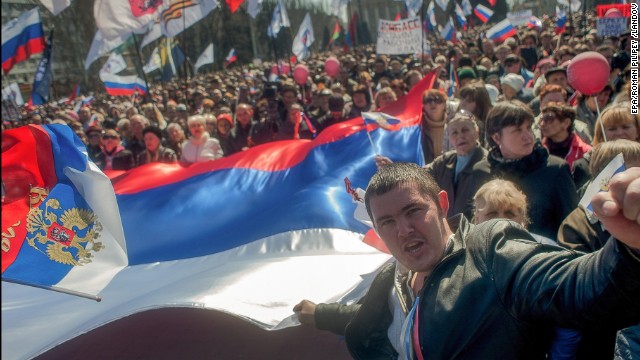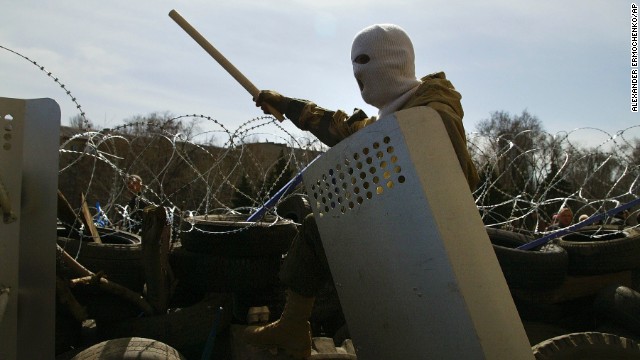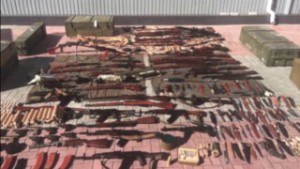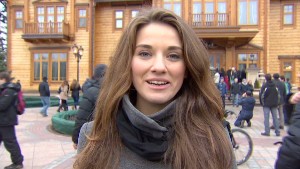Russia trying to 'dismember' Ukraine through protests, Kiev says
April 7, 2014 -- Updated 1625 GMT (0025 HKT)

Russian flag raised over Ukrainian city
VIDEO
.
The protesters broke into
a regional administrative building in the mining city of Donetsk on
Sunday as well as security services offices in nearby Luhansk, where
police said they had seized weapons. A self-proclaimed legislature,
representing what it called the Donetsk People's Republic, then
announced that it would hold a referendum by May 11 on whether the area
should join Russia, Russian state-run news agency ITAR-Tass reported.
The report could not
immediately be independently verified. The Russian news agency also said
the Donetsk group asked Russian President Vladimir Putin to send a
"temporary peacekeeping contingent."
In a televised message,
acting Ukrainian President Oleksandr Turchynov accused Russia of
starting a second wave of a special operation against Ukraine intended
to overthrow the Kiev government.
 Photos: Crisis in Ukraine
Photos: Crisis in Ukraine

Ukraine: Commando plot thwarted

Ukrainian: 'We want to be free'
"Enemies of Ukraine are
trying to play out the Crimean scenario, but we will not let this
happen," he said in the pre-recorded address, blaming "separatist groups
coordinated by Russian special services" of being behind the storming
of buildings.
But in Moscow, the Foreign Ministry said Russia was "watching closely" and told Ukraine to quit blaming it for its problems.
"Ukrainian people want to
get a clear answer from Kiev to all their questions. It's time to
listen to these legal claims," a Foreign Ministry statement read.
Protesters also seized
the regional administrative building in Kharkov. Interior Minister Arsen
Avakov, in the city, said on his Facebook page Monday that the building
had been cleared and that public employees had returned to work. All
three cities lie close to Ukraine's border with Russia.
Mainly Russian-speaking
eastern Ukraine has seen a sharp rise in tensions since a new
pro-European government took charge in Kiev after the overthrow of
pro-Moscow President Viktor Yanukovych in February. Donetsk,
Yanukovych's hometown, has seen several pro-Russian rallies in the last
few weeks.
"It is absolutely clear
that there is a realization of anti-Ukrainian, anti-Donetsk,
anti-Luhansk and anti-Kharkov plans to destabilize the situation. The
plan is (for) foreign troops to cross the border and seize the territory
of the country," Ukrainian Prime Minister Arseniy Yatsenyuk said. "We
will not allow it."
Moscow has branded the
new government illegitimate and last month annexed Ukraine's Crimea
region, citing threats to its Russian-speaking majority -- a move that
has sparked the biggest rift in East-West relations since the end of the
Cold War.
"There is a script
written in the Russian Federation, the purpose of which is only one: the
dismemberment and destruction of Ukraine. ... This cannot be,"
Yatsenyuk said.
Moscow had no immediate word about the comments.
.
Challenge to new government
As the protests unraveled, Kiev dispatched several top security officials to the eastern cities.
The protests are the
latest challenge to Ukraine's embattled new government, coming just
weeks after Russia annexed the Black Sea peninsula of Crimea from
Ukraine, following a local referendum deemed illegal by Kiev and the
West.
On Sunday, a Russian
soldier shot dead a Ukrainian navy officer in an officer's dorm in
Novofedorivka in Crimea, Ukraine's Defense Ministry said in a statement
posted on its website. The Ukrainian officer was getting ready to leave
for mainland Ukraine.
The European Union's
foreign policy chief, Catherine Ashton, said the EU was monitoring the
situation in eastern Ukraine closely with concern.
"We reiterate our call for de-escalation and the avoidance of further destabilization of Ukraine," she said.
'Political tourists'
Concerns are high that
Russia, which U.S. officials have said had about 40,000 troops near the
frontier, might seek to enter eastern Ukraine.
Putin told German
Chancellor Angela Merkel last week that he'd ordered a withdrawal of
some Russian troops from his country's border area with Ukraine,
Merkel's office said.
However, NATO later said it saw no sign that Russia was pulling its forces back from the border.
Yatsenyuk said Monday
that Russian forces had not pulled back, adding that Moscow's troops
were within 30 kilometers (about 19 miles) of the Ukrainian border.
In a televised address
late Sunday, he announced he would travel to his country's eastern
regions "to dismiss their fears." He also said he would offer to
decentralize power and give state financial support to local businesses.
In mid-March, Kiev's new
government warned that pro-Russian forces in other regions might
attempt to follow the model used to wrest Crimea from Ukraine.
Yatsenyuk said demonstrations by what he called "political tourists" with foreign passports were already under way.
CNN's Alla Eschenko and Lindsay Isaac contributed to this report.

No comments:
Post a Comment